#The Coffee One咖啡
Text
2022【榕錦時光生活園區】台北最新網美免費景點.原臺北刑務所官舍
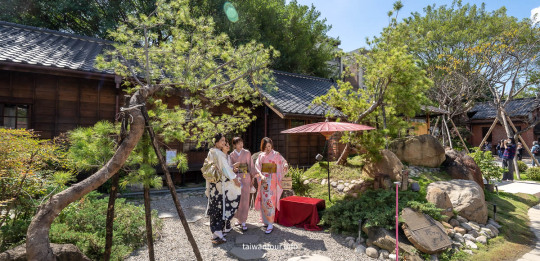
View On WordPress
#A Design&Life Project#rongjin157#The Coffee One咖啡#九州鬆餅瓦芙#京町山本屋#包包專賣CiPU X GOOD GOOD#原臺北刑務所官舍#原臺北刑務所官舍-歷史建築#原臺北刑務所官舍-金華街135號至177號#原臺北刑務所官舍(愛國東路3號)#台北 2天一夜#台北 老人家 景點#台北2天1夜#台北2天1夜行程#台北2天一夜#台北2天一夜 2020#台北2天一夜推薦#台北2天一夜行程#台北2天一夜親子#台北刑務所官舍#台北市 親子 戶外#台北市親子旅遊#台北市親子景點#台北市親子遊#台北親子地點#台北銀髮族景點#吉品養生#吉屋 JeeWoo#好丘 GOOD CHO’S#寵物點子 親子生活用品Mon Bonbon
0 notes
Text
I don't have anything to post right now so here a #multilingualmoment storyfrom a few year ago!
I'm burmese and I was studying in a language program in Korea during this 2018. During a classroom break, I was ordering coffee and this guy comes up behind me, looking at the menu (written in English and Korean only) very confused. Since we're at a building that teaches Korean to international students, there are sometimes people who can't speak Korean very well.
He started mumbling to himself in Chinese like "how to..." but he seemed to be having trouble reading the menu. And no one else was around. So I just turned to him after my order and asked "你想要什么咖啡的?" (what coffee do you want?) and his face lit up! He said "冰咖啡" (iced coffee) , so I turned to the counter, ordered his coffee in Korean and just ran to my class because I was late. I still think about his expression a lot! :D
#I have a lot of “chinese people realize I can speak chinese” stories#but this one specifically is a time I was able to help someone out#honestly I keep this close to my chest and remind myself of this whenever I'm studying#studyblr#story time
24 notes
·
View notes
Text
This box of Tau Sar Piah (豆沙饼) I bought from Mei Kee Bakery (美記餅家) at Yishun Bus Interchange. Coffee Tau Sar Piah (咖啡豆沙饼) – Imagine the classic flavours of savoury tau sar piah with hints of coffee infused within the mung bean paste. Not outstanding but still nice to see something was done to refresh a classic with new flavours.
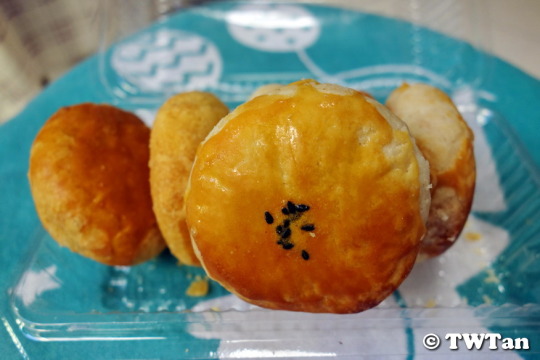
Shrimp Tau Sar Piah (虾米豆沙饼) – First time I came across bean paste biscuits mixed with Hae Bee Hiam (Dried Shrimps Spicy Sambal). My mind visualized a weird tasting tau sar piah but on the first bite, my palates registered a pleasant combination of light spicy umaminess mixed with the classic salty bean paste. I must say, I really enjoy the snack.

Red Bean Tau Sar Piah (红豆豆沙饼) – Just the familiar black coloured red bean paste filled tau sar piah. I know my colleague would love this one. S$1 for each of the flavour but the seller charged me S$5 for 6 pieces.
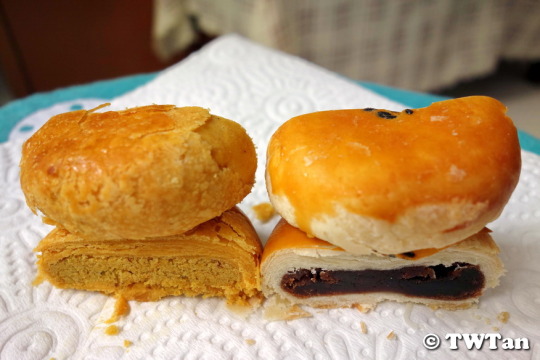
#Mei Kee Bakery#美記餅家#Yishun Bus Interchange#Tau Sar Piah#豆沙饼#Coffee Tau Sar Piah#咖啡豆沙饼#Shrimp Tau Sar Piah#虾米豆沙饼#Red Bean Tau Sar Piah#红豆豆沙饼#Pastry#Biscuit#Red Bean Paste#Sweet#Savoury#Mung Bean Paste#Crispy#Flaky#Black Sesame Seeds#Baked#Chinese#Snack#Food#Buffetlicious
26 notes
·
View notes
Text
this is literally THE modern zayne/mc song wth???
沉溺(你讓我的心不再結冰)— Drowning (You Keep My heart from freezing)
(lyrics under cut)
Baby don’ t leave me
答應我像每晚的暮色
Promise me that like the twilight every night,
只對我一個人燃起
You'll light up only for me.
比昨天更想你
I miss you more than yesterday.
就像太陽在照常升起
As constantly as the sun rising everyday,
我對你的愛從一開始就不會缺席
My love for you has never been gone for even a single day.
[Chorus]
被咖啡的香味叫醒
Wake up to the smell of coffee,
為我吹乾頭髮的你
Blow-drying my hair for me
讓我有種不真實又患失的感受
It all feels unreal it makes me worry about losing you
背著我踩沙灘的你
You carry me at the beach
額頭的汗落在手心
The sweat on your forehead falling on my hands
我明白夢中親吻我的那個人是你
I know that the person kissing me in my dreams is you
Baby
你讓我的心不再結冰
You keep my heart from freezing
初雪我們圍一條圍巾
Let's wear a scarf at the first snowfall
整日沈溺在你的眼睛
Addicted to your eyes all day long
你的深情
In your affection
望不到底
I drown endlessly
Come on come on
靠我的胸口
Lie down on my chest
我的心臟
My heart
隨時為你跳動
Beats for you always
漫天雪花
Snowflakes fall from the the sky
誰都不能摘走
No one can take it away
落在你的臉
They land on your face
忍不住的觸碰 yeah
I can't help but touch them, yeah
We can just groove all night
不願讓你獨自醒來
I don't want you to wake up all alone
你讓我的世界花開
You make my world bloom
融化了冰川
and its glaciers melt
就抱緊你的腰
I'll just hold onto your waist tightly
什麼都不去想
Don't think about anything
如果可以我想就這樣一直到老
If possible, I want to stay like this until we grow old
我想你也明了
I think you also understand
對我多麼重要
how important it is to me
才會讓時間定格這一秒
To let time freeze for this second
All I mean is you
All I need is you
All I got is you
All I want is you
一想到
Just thinking of you
[Chorus]
被咖啡的香味叫醒
Wake up to the smell of coffee,
為我吹乾頭髮的你
Blow-drying my hair for me
讓我有種不真實又患失的感受
It all feels unreal it makes me worry about losing you
背著我踩沙灘的你
You carry me at the beach
額頭的汗落在手心
The sweat on your forehead falling on my hands
我明白夢中親吻我的那個人是你
I know that the person kissing me in my dreams is you
Baby
你讓我的心不再結冰
You keep my heart from freezing
初雪我們圍一條圍巾
Let's wear a scarf at the first snowfall
整日沈溺在你的眼睛
Addicted to your eyes all day long
你的深情
In your affection
望不到底
I drown endlessly
9 notes
·
View notes
Text
今日學的詞 [Daily Vocab]
想把日常新詞寫下來;今天看完骨科跟爸爸去咖啡店,點了一杯 「金銀花拿鐵」 (用茉莉花茶,蜂蜜,和葉子奶做的)和番茄奶酪帕尼尼,特別適合今天的天氣(今年的初雪!)。
因為咖啡店牆上展示很多當地畫家的作品,我們開始聊台灣有名的藝術家。特別談了朱銘和洪通:朱銘是一位雕塑家,最有名的作品是他的[太極]雕刻,去年才過世的。他的美術館裡我爺爺的墳塋很近。
洪通是70年代初名的 「東方的畢卡索」。50歲才開始學畫,他的藝術使用原始主義裝飾常見的幾何紋漾。雖然很快的成為全臺焦點人物,隱居後速被大眾遺忘,窮困終老。
茉莉花茶 [mòli huāchá] - jasmine tea (can also use 香片)
金銀花 [jīnyínhuā] - honeysuckle
奶酪 [nǎilào] - cheese
帕尼尼 [pàníní] - panini (loanword)
初雪 [chùxuě] - first snow
展示 [zhǎnshì] - exhibit
雕刻 [diāokè] - sculpture/carving
原始主義 [yuánshǐzhǔyì] - primitivism
幾何 [jǐhé] - geometry
隱居 [yǐnjū] - withdraw from society

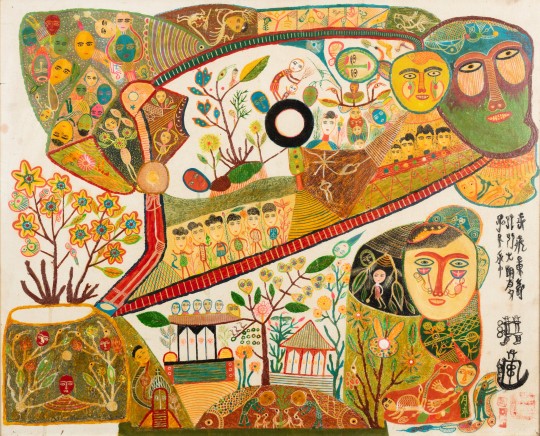
[eng tl under the cut]
Wanted to note down new vocab words I come across on the daily; After my appointment at the orthopedics, I went to a coffee shop with my dad and ordered a honeysuckle tea latte and a tomato mozarella panini, which was perfect for today’s weather (this winter’s first snow!).
Since the coffee shop was exhibiting a lot of local artists’ paintings, we started to talk about famous painters from Taiwan. In particular, we discussed Ju Ming and Tong Hong—Ju Ming was a sculptor most famous for his Tai Chi sculptures, having only passed away last year. His museum is very close to my grandpa’s gravesite.
Hong Tong was an artist popular in the 70s, known as “The East’s Picasso.” Having only started painting at the age of 50, his works were known for commonly featured the geometric shapes of primitivism. Although he quickly rose to become one of Taiwan’s central figures in the art world, he was quickly forgotten after choosing to live in seclusion, and died in relative poverty.
9 notes
·
View notes
Text



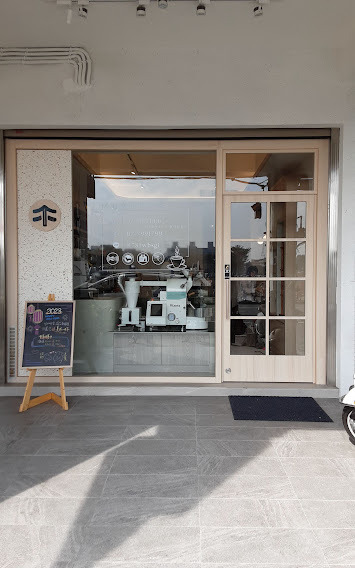



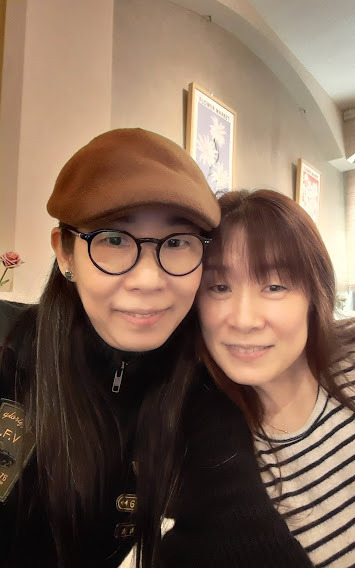
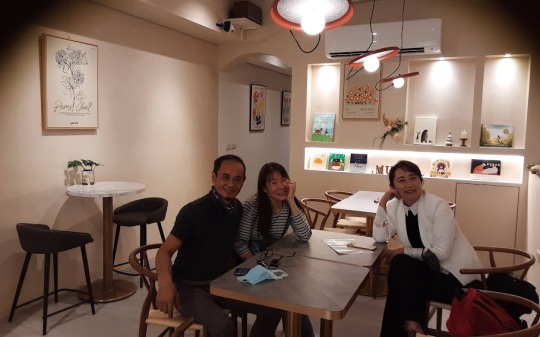



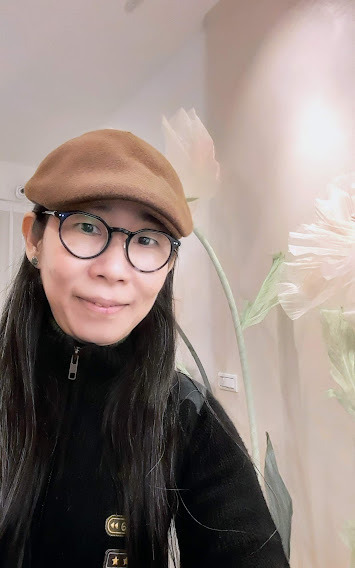
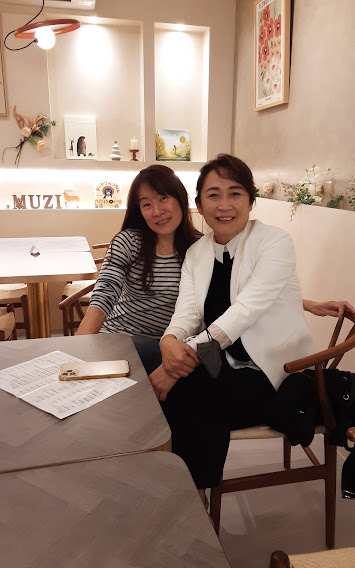
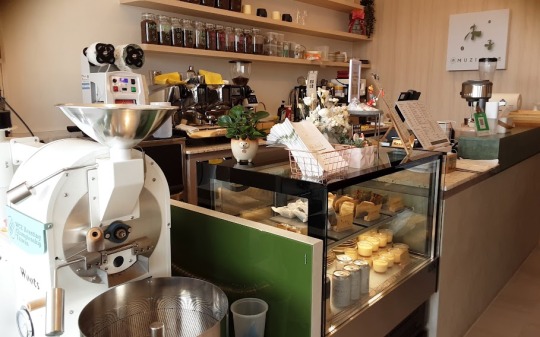
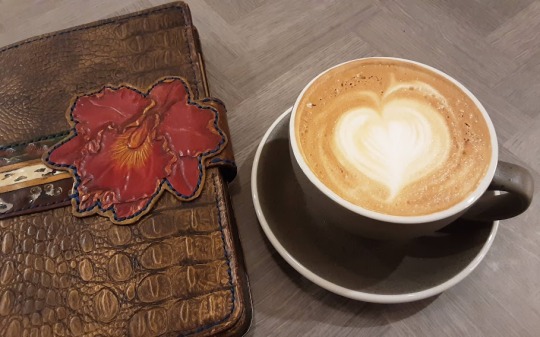
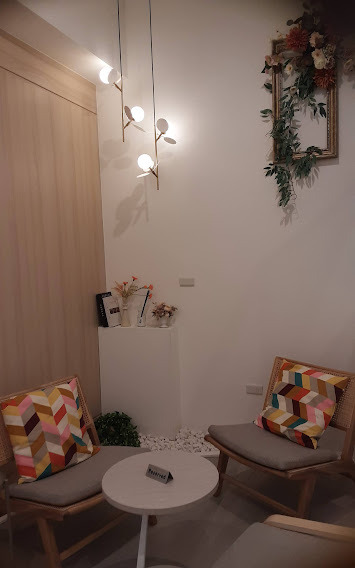


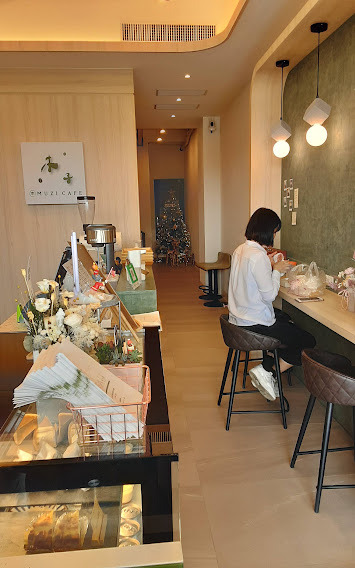



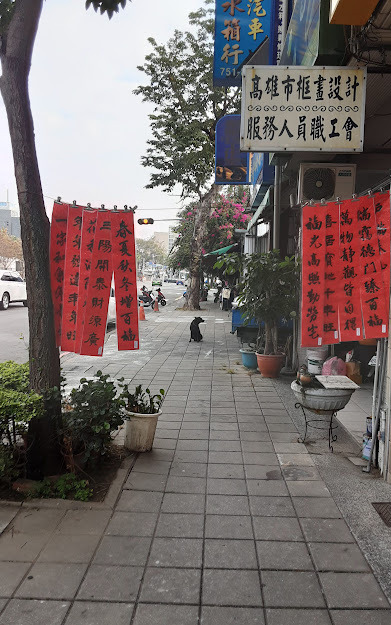

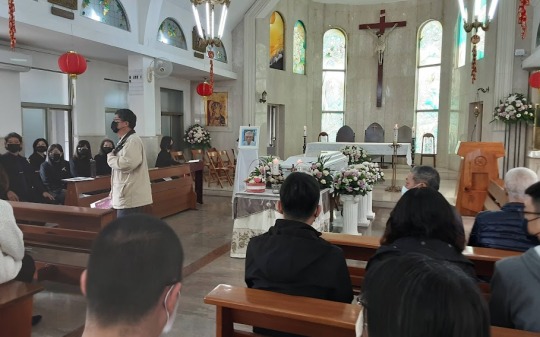
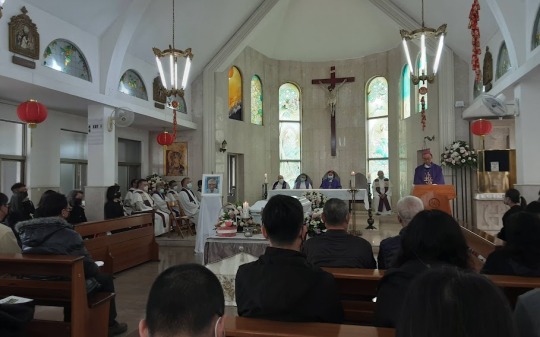
前天我們去參加好朋友的父親的殯葬彌撒然後去喝咖啡午餐小聚,典型的流淚在先,歡笑於後。約莫一週內共2位教會的好朋友的父親皆相繼去世,而且是在農曆新年前夕,無限哀思並為他們90多歲高壽感謝慶祝 …
The day before yesterday we went to a good friend's father's funeral mass and then went to have a break coffee lunch. Typical tears first, laughs later. In about a week, the fathers of 2 good friends of the church passed away one after another, and it was on the eve of the Chinese Lunar Year. We're so sad and celebrated to their over 90 years lonmg life for both elder at same time! …
人終究會一死,所以隨時要準備好自己的靈魂去面對死亡是人生很重要的功課。
People will die eventually, so preparing your soul to face death at any time is an important lesson in life.
Lan~*
#chu lan#chulanmaria#taiwan artist city life#fine craft artist#leather art artist#good friends#eat live love#funeral mass#strong friendship#朱蘭皮藝
29 notes
·
View notes
Text
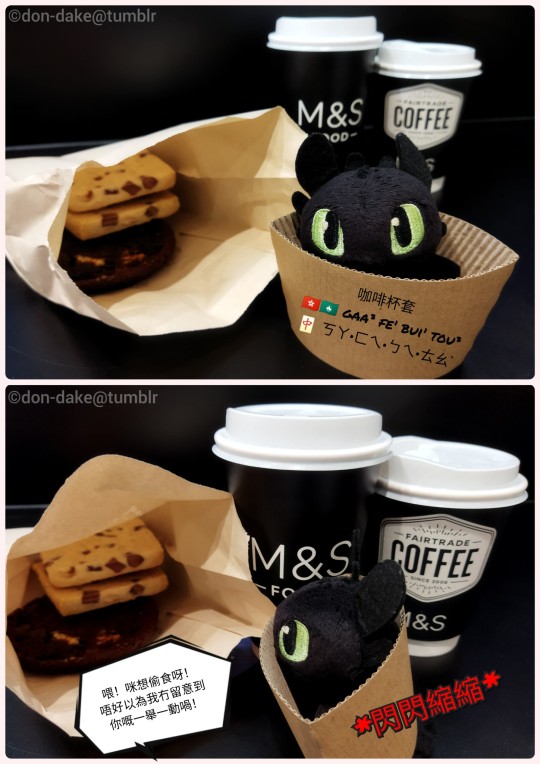
Was blanking out on what to call that cardboard thingy used to protect one's hands from hot 🔥 coffee ☕ (turns out it's simply a “sleeve” or “Java Jacket”), and then realised I didn't know what it was called in Chinese either…fixed that!
新詞:咖啡杯套 (🇭🇰🇲🇴 gaa³ fe¹ bui¹ tou³, 🀄 ㄎㄚ•ㄈㄟ•ㄅㄟ•ㄊㄠˋ)
#My Snapshots#Merch#小龍#Food#My Edit#Cantonese#Mandarin#Canto I learn?#Mandoring along#Chinese Language#Language
7 notes
·
View notes
Text
Mandarin vocabulary
Phrasebook
General sentences for everyday use
你好,你身体好吗?(Nǐ hǎo, nǐ shēntǐ hǎo ma?) – Hello, how are you?
我是优良。(Wǒ shì yōuliáng.) – I am fine.
给我咖啡。(Gěi wǒ kāfēi.) – Bring me coffee.
停那儿。(Tíng nà’er.) – Stay there.
到这儿来/过来。(Dào zhè’er lái/guòlái.) – Come here.
进去。(Jìnqù.) – Go inside.
在草坪等一等。(Zài cǎopíng děng yī děng.) – Wait in the lawn.
在门见面。(Zài mén jiànmiàn.) – Meet at the gate.
行在人行道。(Xíng zài rénxíngdào.) – Walk on the pavement.
这不是停车场。(Zhè bùshì tíngchē chǎng.) – It is not a parking place.
笔在箱子里。(Bǐ zài xiāngzi lǐ.) – The pen is in the box.
你的鞋子在桌子下。(Nǐ de xiézi zài zhuōzi xià.) – Your shoe is under the table.
绿色条纹在百色条纹上。(Lǜsè tiáowén zài bǎisè tiáowén shàng.) – The green stripe is below the white one.
从地面上把球拿起来。(Cóng dìmiàn shàng bǎ qiú ná qǐlái.) – Lift the ball from the ground.
收吧。(Shōu ba.) – Take it.
给我本文。(Gěi wǒ běnwén.) – Give me the paper.
外面冷一点儿。(Wàimiàn lěng yīdiǎn er.) – It is cold outside.
里面潮湿一点儿。(Lǐmiàn cháoshī yīdiǎn er.) – It is rather humid inside.
这还显得脏。(Zhè hái xiǎndé zàng.) – It still appears dirty.
她还没有来。(Tā hái méiyǒu lái.) – She has not come yet.
好,现在显得干净。(Hǎo, xiànzài xiǎndé gānjìng.) – Yes, now it appears clean.
楼上去。(Lóu shàngqù.) – Go upstairs.
楼下来。(Lóu xiàlái.) – Come downstairs.
我要一个洗衣的人。(Wǒ yào yīgè xǐyī de rén.) – I want a washer man.
附近有洗衣店吗?(Fùjìn yǒu xǐyī diàn ma?) – Is there a laundry nearby?
她可以把这件衬衣电烙好吗?(Tā kěyǐ bǎ zhè jiàn chènyī diàn lào hǎo ma?) – Can she iron this shirt well?
快叫她。(Kuài jiào tā.) – Call her quickly.
时间晚了。(Shíjiān wǎnle.) – It is getting late.
时间还早。(Shíjiān hái zǎo.) – It is quite early.
快跑。(Kuài pǎo.) – Run faster.
慢走。(Màn zǒu.) – Walk slowly.
报纸放在床上。(Bàozhǐ fàng zài chuángshàng.) – The newspaper is on the bed.
词典放在杂志上。(Cídiǎn fàng zài zázhì shàng.) – The dictionary is above the magazine.
邮局在前面。(Yóujú zài qiánmiàn.) – The post office is in front.
它的后面是什么?(Tā de hòumiàn shì shénme?) – What lies behind it?
有一棵印度榕树在清真寺旁边。(Yǒuyī kē yìndù róngshù zài qīngzhēnsì pángbiān.) – There is a banyan tree beside the mosque.
你是东方旅行的吗?(Nǐ shì dōngfāng lǚxíng de ma?) – Are you from Oriental Travels?
这次电话谈判办事吗?(Zhè cì diànhuà tánpàn bànshì ma?) – Will this phone call do?
我们想参观上海。(Wǒmen xiǎng cānguān Shànghǎi.) – We want to visit Shanghai.
为四个成人。(Wèi sì gè chéngrén.) – For four adults.
为成人。(Wéi chéngrén.) – For adults.
步,没有孩子。(Bù, méiyǒu háizi.) – No, there are no children.
是, 没有二十五以下的人。(Shì, méiyǒu èrshíwǔ yǐxià de rén.) – Yes, no one is under twenty–five.
四天包括和拥有旅行?(Sì tiān bāokuò hé yǒngyǒu lǚxíng?) – For four days including the up and down journey?
包活所有饭食?(Bāo huó suǒyǒu fànshí?) – Including all meals?
除了午餐?(Chúle wǔcān?) – Excluding lunches?
你请求太多。(Nǐ qǐngqiú tài duō.) – You are asking too much.
不,这不是合理的。(Bù, zhè bùshì hélǐ de.) – No, it’s not reasonable.
你将提供那辆车?(Nǐ jiāng tígōng nà liàng chē?) – Which vehicle will you provide?
这是一个公用电话摊?(Zhè shì yīgè gōngyòng diànhuà tān?) – Is it a public telephone booth?
我打这儿可以拨外线吗?(Wǒ dǎ zhè’er kěyǐ bō wàixiàn ma?) – Can I make an international call from here?
并且博内线吗?(Bìngqiě bó nèixiàn ma?) – And local calls as well?
你也有网记网设施吗?(Nǐ yěyǒu wǎng jì wǎng shèshī ma?) – Do you also have netbook facilities?
这里我可以检查我的电子信函吗?(Zhèlǐ wǒ kěyǐ jiǎnchá wǒ de diànzǐ xìnhán ma?) – Can I check my email here?
你们的用网价是多少?(Nǐmen de yòng wǎng jià shì duōshǎo?) – What rate do you charge for net surfing?
如此你卖古物吗?(Rúcǐ nǐ mài gǔwù ma?) – So you sell antiques?
也现代工艺品吗?(Yě xiàndài gōngyìpǐn ma?) – And modern art works?
那个硅盖帽是多少?(Nàgè guī gàimào shì duōshǎo?) – How much is that silicon cap?
不,在橙色后边的红色的一个。(Bù, zài chéngsè hòubian de hóngsè de yīgè.) – No, the red one behind the orange one.
我的神,它是很昂贵的吗?(Wǒ de shén, tā shì hěn ángguì de ma?) – My god, is it so expensive?
有一点儿莲价玛?(Yǒu yīdiǎn er lián jià mǎ?) – Something cheaper?
这个古铜色片断合格为古董吗?(Zhège gǔtóngsè piànduàn hégé wèi gǔdǒng ma?) – Does this bronze piece qualify as an antique?
好,包装它。(Hǎo, bāozhuāng tā.) – Okay, pack it.
别延迟。(Bié yánchí.) – Don’t delay.
劝告他保留他的手指片断。(Quàngào tā bǎoliú tā de shǒuzhǐ piànduàn.) – Tell him to keep his fingers off the piece.
我的鞋则需要擦亮剂。(Wǒ de xié zé xūyào cā liàng jì.) – My shoes need polish.
我要剪头。(Wǒ yào jiǎn tóu.) – I need a haircut.
我俩去理发馆吗? (Wǒ liǎ qù lǐfǎ guǎn ma?) – Will I have to go to the hairdresser?
你意味什么?(Nǐ yìwèi shénme?) – What do you mean?
你着急什么呢?(Nǐ zhāojí shénme ne?) – Why are you worried?
你怎么烹调它?(Nǐ zěnme pēngtiáo tā?) – How do you cook it?
你何处得到了它?(Nǐ hé chù dédàole tā?) – Where did you get it?
哪一个是你的?(Nǎ yīgè shì nǐ de?) – Which of these is yours?
我们什么时候去?(Wǒmen shénme shíhòu qù?) – When do we go?
锋利这支铅笔。(Fēnglì zhè zhī qiānbǐ.) – Sharpen this pencil.
什么事?(Shénme shì?) – What is the matter?
这听起来不好。(Zhè tīng qǐlái bu hǎo.) – It doesn’t sound good.
上第二个小时我准备了。(Shàng dì èr gè xiǎoshí wǒ zhǔnbèile.) – I have been ready for the last two hours.
我不相信它。(Wǒ bù xiāngxìn tā.) – I don’t believe it.
20 notes
·
View notes
Text
Heijun's Playlist
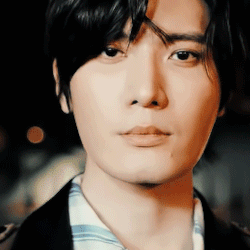
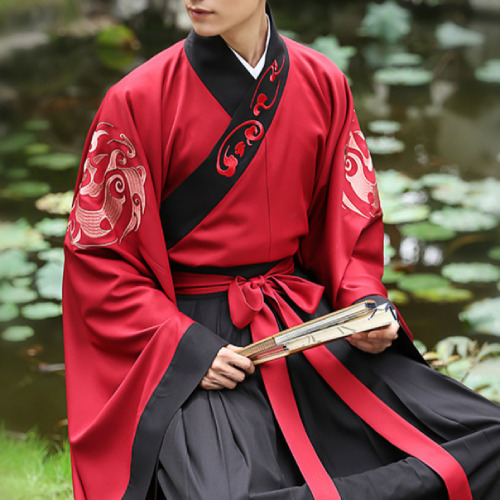

Link: Devoted Commander
Descendants of the Dragon by Lay Zhang
“If you want to fight, let's start a fight... If you don't attack, I won't attack either. But in case of danger, I'm always ready for battle.”
小星星(Xiao Xing Xing (Little Star)) by Zhou Zhennan
“I am just a puppet controlled by jealousy, anger, and ego. Today the puppet is awakening but loneliness shattered my soul.”
鬥牛 (dòuniú (Bullfighting)) by Hua Chenyu
“Wildness bares the purity of the soul or its recklessness. After they nurtured the original sin their hands now seek to destroy it.”
靈 (Soul) by Lay Zhang
“I will always fly higher until I find my way. I'll dispel all my fears. I wanna meet a new beautiful soul. I wanna see a complete and unsullied best new soul.”
敏感 (Sensitive) by Lu Han
“Bad moods are fleeting. The inner villain is about to lose. I hope the world can be more generous today. You don't have to live up to anyone's expectations.”
你也会像我一样 (You'll be Like Me/One) by Z.Tao
“Today after yesterday, the heart has never been forgotten. I am no longer good at expressing myself. Never forgot who I am from the beginning till now.”
講個笑話 (Tell Me A Joke) by Silence Wang
“How can my world keep raining? My mood is a secret that no one believes. I don’t want to play a game of talk, I just want to get lost in the room where the lights are off.”
I Will Show You by Zhou Zhennan
“In my last moments, I will show you who I really am. Before I give up myself, don't try to make me stop it. You'd better not.”
咖啡 (Coffee) by Luhan feat. Kris Wu
“I want a cup of coffee. Dust of the dirt on my shoulders. This world is crazy, I’m feeling lazy. Give me a cup of coffee.”
夜 (Late Night) by Lay Zhang
“I'll show you all. Inside my soul, everything is unknown. In the dim light, I hug myself, doubtful I've chosen the right direction to achieve my unclear goals.”
天空海 (Horizon) by WayV
“Even though it’s foggy ahead, little by little, the distance will narrow. I won't hesitate. With firm footsteps I believe, once I cross this obstruction, you’ll be there.”
Profile | Personality & Abilities | History
3 notes
·
View notes
Photo

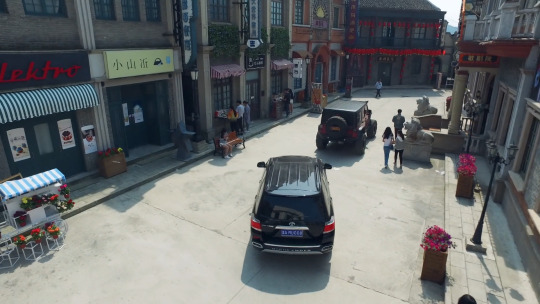
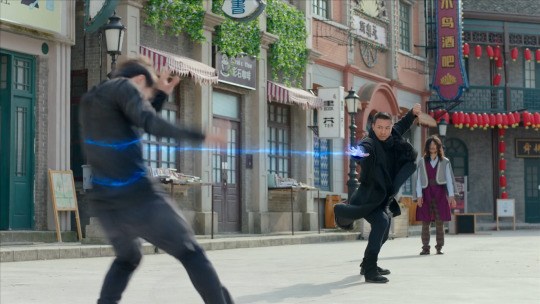
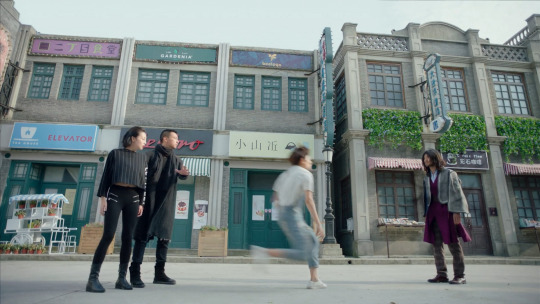
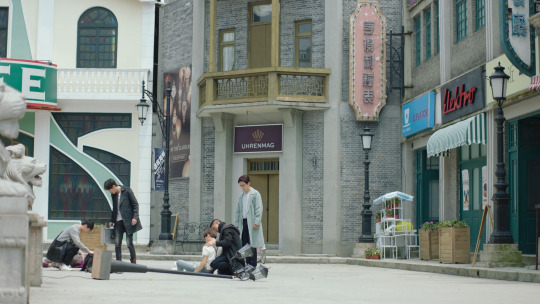

I love how this little corner exists as an obvious acknowledgment that, okay, look, there’s got to be some shops on this here street that don’t look like they’ve remained preserved in amber since 1935. And so we’ve got a handful of signs that actually look like they’ve been made in the last ten years:
Uhrenmag. I love how you can tell just from the logo that it’s a watch store. The ad (”INSPIRED BY THE CLASSICAL”) is just extra evidence. (Fun fact: If you search “Uhrenmag”, pretty much the only hit is for the person who appears to have designed that logo, which tickles me.)
二丁目食堂. The last two characters establish that this is a dining hall; the first three are the name. I know the middle one looks like an S, but @bisouette saw it’s a more stylized 目 instead.
GARDENIA®. For my money, this one looks less like a storefont sign and more like an ad for some natural soap or essential oil or something. Probably smells like gardenia!
beelogo. I want to go to beelogo.
ELEVATOR TEA HOUSE. The tea bag tag is a house! Get it? Seriously, that’s the cutest shit. ELEVATOR also seems to have a zippy little flower cart they roll in front of the doors when it’s not in business. Someone hasn’t been watering the plants, because by the time endgame comes, they’re all dead. (Actually, by the time endgame comes, a lot of formerly vibrant greenery is croaking, whups.)
Elektro. My favorite thing about Elektro is that judging by the ads in the windows, it’s a bakery.
小山㳋. Literally just “hill river”, which is also what the logo looks like. It’s got some similar posters on its front doors, so maybe it’s the bakery and Elektro is something else? Either way, it’s got a cool star statue out front.
彩石咖啡. This gets rendered as “coral coffee” on the sign (with the o’s as little coffee beans, cute), but those first two are just “color” and “stone”. I like @bisouette‘s suggestion that it’s a reference to Nüwa’s patching the heavens with colored stones, which would be an even sneaker reference to the book than Da Shenmu in the DCU seal. In the absence of other evidence, I’m going to choose to believe that’s true.
5 notes
·
View notes
Text

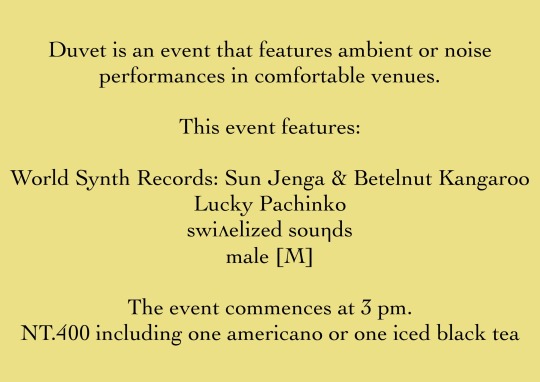


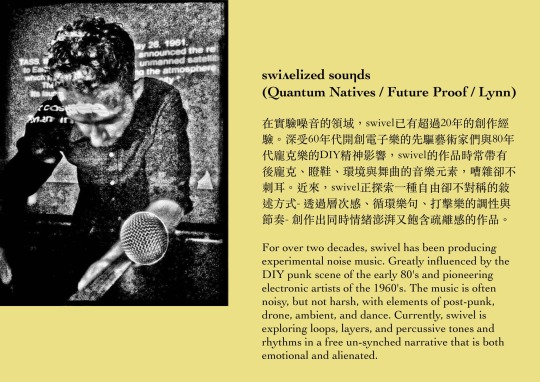
岸畔2024第一場動態活動,邀請到Duvet帶來精彩的陣容和音樂演出,歡迎大家一起來玩!
活動名稱:Duvet presents Coffee
時間:2024/02/18(日)3:00pm
地點:岸畔咖啡 (台北市同安街90-1號)
票價:NT 400 (附美式咖啡或冰紅茶)
演出陣容:
World Synth Records: Sun Jenga & Betelnut Kangaroo
Lucky Pachinko
swiʌelized souηds
male [M]
活動頁面:https://reurl.cc/j364n1
We are thrilled to announce our first live performance, “Duvet presents Coffee,” at Kishibe Cafe in 2024. An amazing line-up is ready for you! Join us for a great afternoon of music, coffee, and fun!!
Duvet presents Coffee
18 February 2024, 3:00pm
Kishibe Cafe (No. 90-1, Tong’an Street, Taipei)
NT 400 (including one americano or one iced black tea)
Duvet is an event that features ambient or noise performances in comfortable venues. This event features:
World Synth Records: Sun Jenga & Betelnut Kangaroo
Lucky Pachinko
swiʌelized souηds
male [M]
Event Page: https://reurl.cc/j364n1
0 notes
Text
Must…Have..Cotti Coffee ☕ #库迪咖啡代言人王一博
I want one if the bags! That pic of Yibo is really cute.
0 notes
Text
The family Reunion Dinner (团圆饭) and ancestor worship are the two of the most important highlights of the celebrations on Chinese New Year Eve. The Lunar New Year is traditionally ushered in at 11 pm, but many families, especially those in Singapore, have adopted 12 am as the norm.
除夕夜,送祝福,团圆饭,多幸福。健康的如意果,平安的蹄髈,快乐的烤鸭,幸福的银耳莲子粥,还有吉祥的米饭,伴你除夕夜快乐不断,幸福绵绵!

This year Reunion Dinner (年夜饭) we had it much earlier than previous year as otherwise my brother would not be able to participate due to his company sending him for oversea training trip. Both my brothers had suggested Lai Huat Signatures (来發) at Gambas Crescent for this year dinner gathering. Requested one of my brother to make reservation for dinner at 6pm.
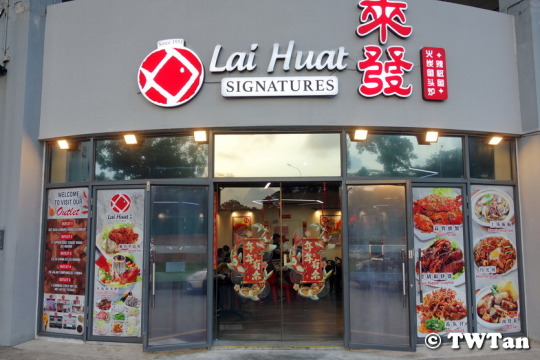
When we arrived, the dining area was almost full as more customers continued to stream into the room. There were three menus on the table – Ala carte, Steamboat and Chinese New Year Set Menu. We went for the former as the CNY menu were prized at S$318+ (5-6 pax), S$518+ (8-10 pax) and S$888+ (8-10 pax) respectively and not value for money. Below are some sample pages from the ala carte menu.
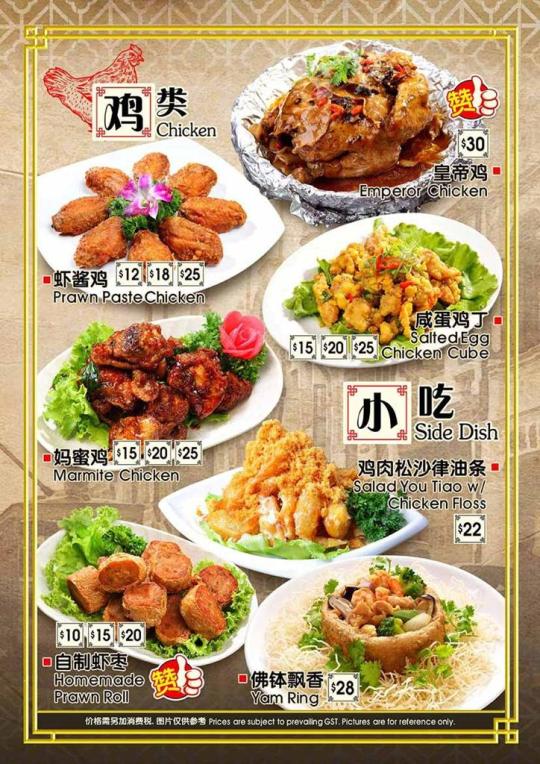
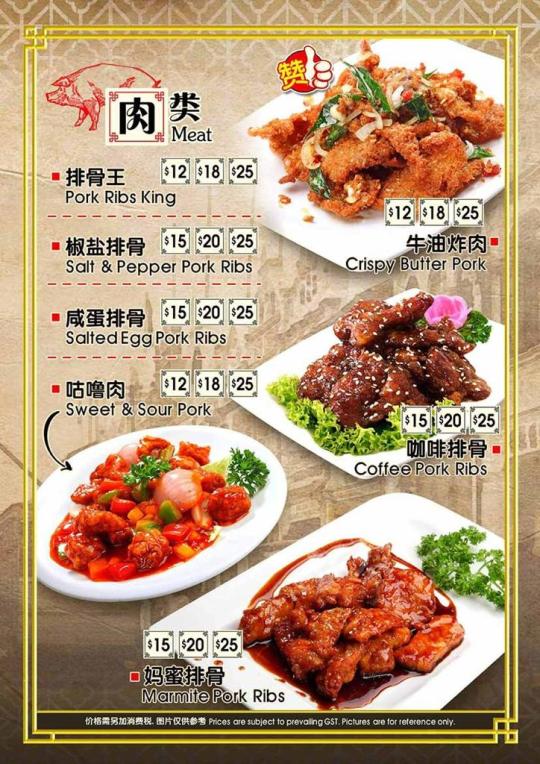
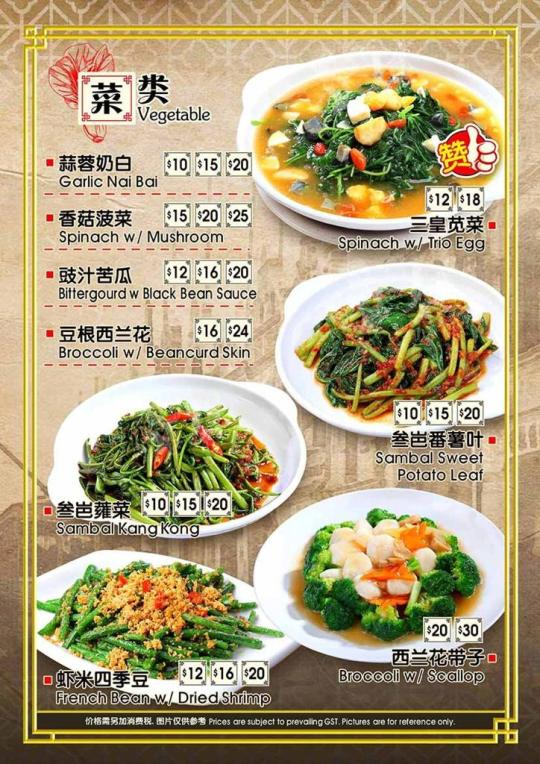
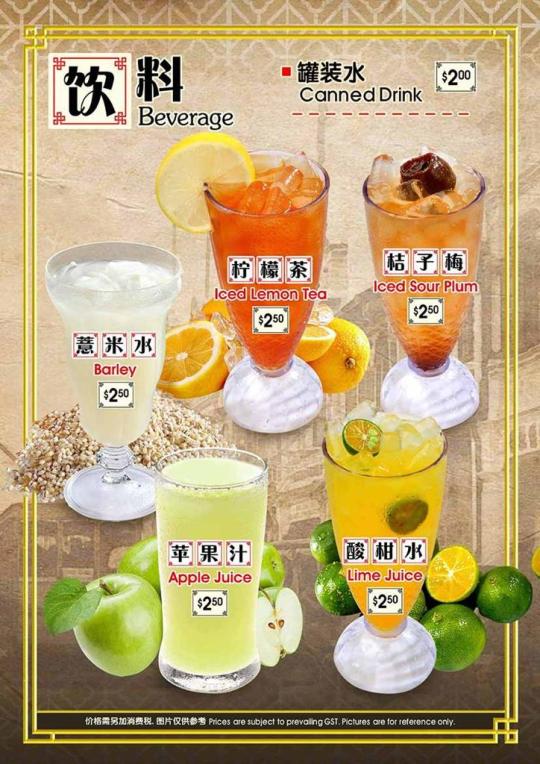
We sipped on our drinks and waited patiently because the kitchen is busy with the packed crowds. Once the first course was served, the rest followed one after another in quick succession. The Salted Egg Chicken (咸蛋鸡丁) with its boneless chunks of meat was deep-fried with curry leaves and tossed in a salted egg yolk mixture of chilli, butter and evaporated milk. The savoury sweet chicken is crispy with taste of salted egg and mild spiciness.
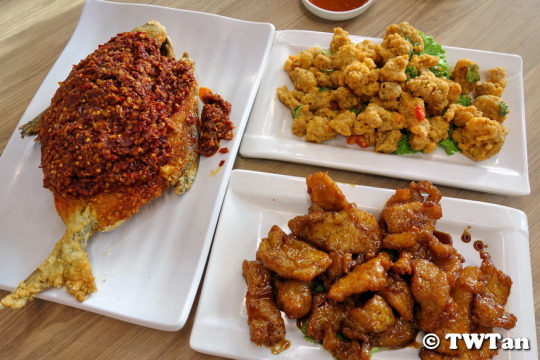
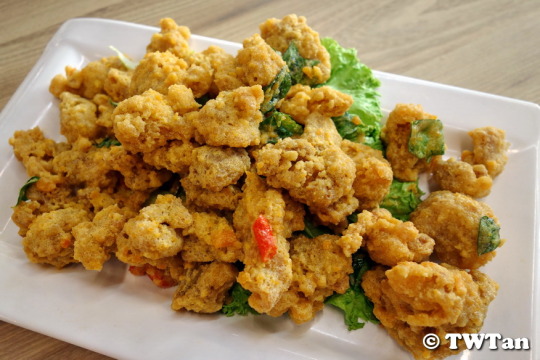
One of my brothers ordered this large portion of their famous Sambal Promfret (叁峇鲳鱼). The whole deep-fried fish was covered with fiery looking red sambal chilli paste. Was expecting the sambal to be spicy hot but surprisingly, the Scoville heat level was well within our limit and it actually tasted delicious with the rice white. The poor fish on the other hand was fried to a crisp and pretty hard to get the flesh off the bones. I suggested this Coffee Pork Ribs (咖啡排骨) as I love coffee. While the boneless pork is tender and fragrant with authentic flavour profile of coffee, it seems to lack some kind of oomph to bring this dish to the next level. Decent and perfectly edible but not good enough for me.
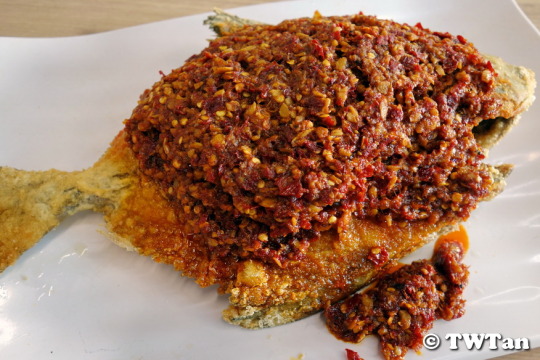
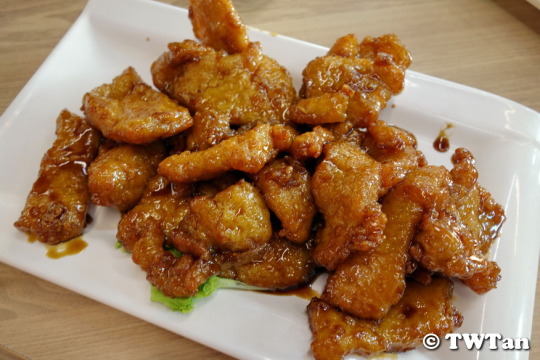
Menus are from Lai Huat Signatures.
#Lai Huat Signatures#来發#Gambas Crescent#Tze Char#煮炒#Reunion Dinner#年夜饭#团圆饭#团年饭#2024#Chinese New Year#春节#Lunar New Year#农历新年#Salted Egg Chicken#咸蛋鸡丁#Sambal Promfret#叁峇鲳鱼#Coffee Pork Ribs#咖啡排骨#Food#Buffetlicious
29 notes
·
View notes
Text
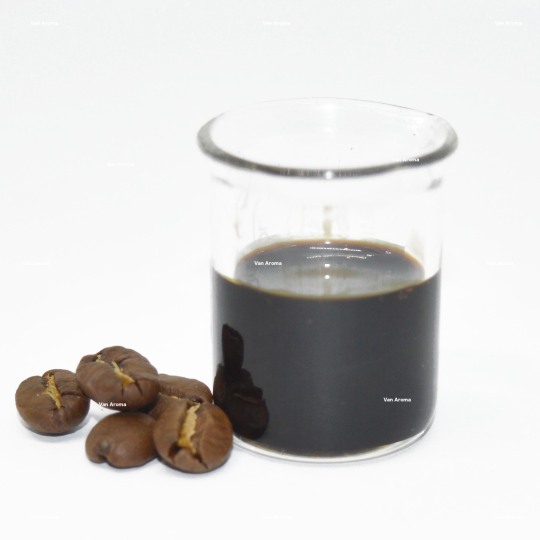
Coffee Extract (Coffea arabica and Coffea canephora) - Van Aroma
Van Aroma is one of the leading producers of Coffee Extract. Van Aroma is one of the biggest exporters in Indonesia. We produce and export Coffee Extract from sustainable, and fully traceable sources.
Indonesia is currently the 4th largest producer of coffee in the world after Brazil, Vietnam, and Colombia at approximately 9.3 Million MT per Annum. Van Aroma’s Coffee Extract is derived from both Arabica and Robusta beans. While coffee extract in general has a sweet, smooth, woody and roasted aroma, Arabica tends to exude these qualities better than Robusta.
Coffea Arabica (Coffee) Seed Extract / Extracto de café arábica / Extrait de café arabica / 咖啡阿拉比卡水提取物
Olfactive Profile: Coffee, earthy, fruity, bitter
CAS No: 84650-00-0
EC No: 283-481-2
Product Synonyms: coffea, cofea, kopi
Certification: Kosher, Halal, FSSC 22000
For more info, visit our official website
0 notes
Text
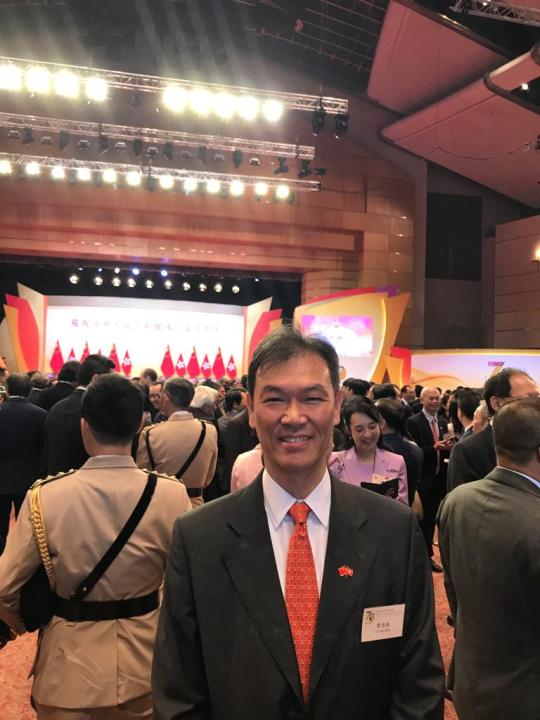
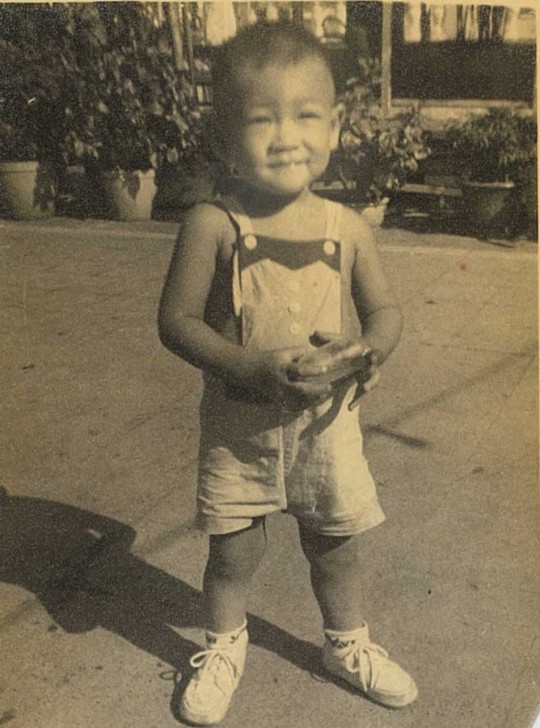

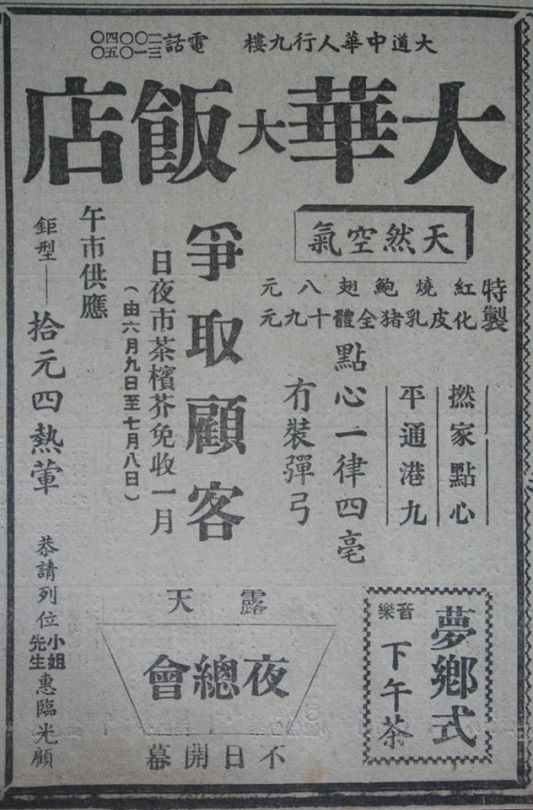
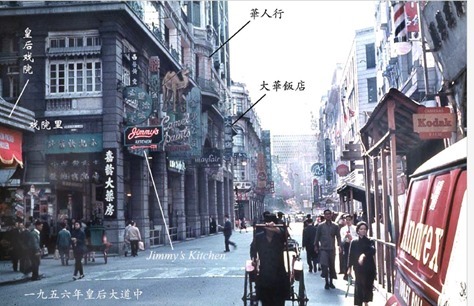



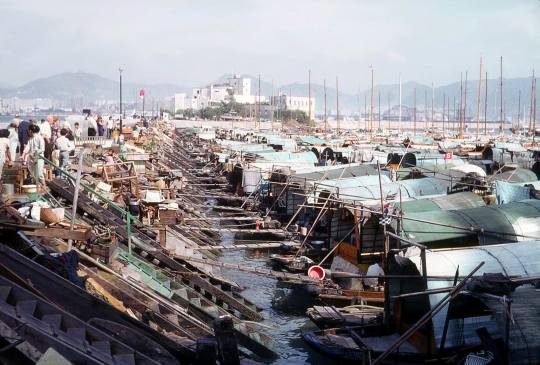
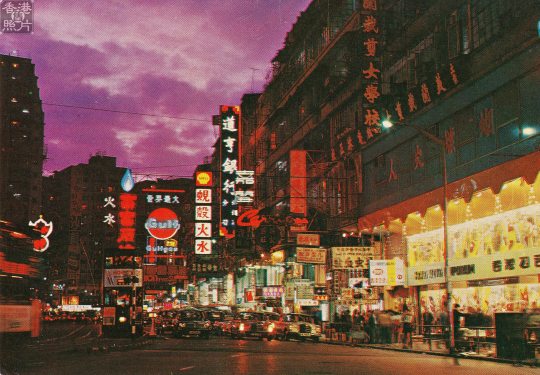

Causeway Bay: The Fascinating History Of ‘The Diamond Of Hong Kong’, From Coffee Farm To Simple And Innocent Residential Area With Warehouses In The 1950s, As Recollected By A Barrister David Lai
I do not keep a diary. I remember too little. When I was in a scene, I hardly paid it any mind. The memory of being with others is often offered by others to me as a lasting impression of their own.
Causeway Bay (CWB) (銅鑼灣) is a very famous shopping district in Hong Kong. There is a big department store Sogo and what in front of it is the super busy pedestrian scramble crossing. Every minute, people in all directions inundate the entire intersection. The spectacular sight ‘Sogo Crossing’ is akin to the famous ‘Shibuya Crossing’ in Tokyo.
CWB means Copper Gong Bay. In 1916, the southern foothills of it were coffee plantations. There is still a cemetery by the nickname of ‘coffee plantation cemetery’ (咖啡園墳場). Its proper name is Mount Caroline Cemetery.
CWB was originally a bay located between North Point (北角) and Wan Chai (灣仔). The area has been chiefly reclaimed along the southern seashore of Victoria Harbour(維多利亞港). CWB of today is an area that was water a few hundred years ago. In 1841, the British colonial government sold a large plot of land, very near the typhoon shelter where thousands of fishermen lived, to the opium trader Jardine Matheson and they turned the area into godowns and factories.
My barrister friend David Lai (黎德誠) remembered, “In the 1950s when I was a child living there, Causeway Bay was not as busy as Central (中環) or Wan Chai (灣仔). The huge warehouses area was later demolished and turned into many stylish residential blocks with seaview balconies in the late 50s. These blocks now form the bustling shopping district of Paterson Street (百德新街), Great George Street (記利佐治街) and Kingston Street (京士頓街).”
David is quick-witted, helpful and sincere. His grandfather and father were grain trading merchant in Mainland China, Hong Kong and South Asia before World War II. After the war, his father assisted in managing one of the first 5-star Chinese restaurant Café de Chine (大華大飯店) with a nightclub on the rooftop at the junction of Pedder Street (畢打街) and Queen’s Road Central (皇后大道中). He was a sporty and righteous young man. In the 70s, he was an Assistant Station Officer of the Hong Kong Fire Services Department, starting as a Probationary Inspector of the Royal Hong Kong Police and, as time went by, served as the Personal Assistant of the Commissioner of Police Raymon Anning (顏理國) and as the Head of Interpol Hong Kong before leaving the Force to join the private sector as top executive of local entities and regional head of multinational corporations. Fond of law and court trials, the secret urge of being a brave barrister crashed on him. He gave up his corporate’s top executive career and started afresh as a junior lawyer. Now, he is a busy barrister boxed up in his office helping people to look for justice especially over trust and commercial matters.
David sighed, “When I was a child, the northeast side of Causeway Bay was quiet as there were many warehouses including cold storage(The Dairy Farm Ice & Cold Storage Co) and ice factories. A typhoon shelter was outside the waterfront (it was later reclaimed to become Victoria Park (維多利亞公園), the biggest park in Hong Kong).
During the day, thousands of fishermen lived on boats in the shelter. At night, some boats hang up red lanterns and put up colourful paper festoons. They became seafood restaurants. Other boats became floating cabarets. The air was pervaded with singing, music of erhu and claps of the hands. The water shelter was also a ‘swimming pool’ for the kids. We caught small mussels, cockles and clams and later surrendered them to mother for cooking.”
I asked David, “What are your special memories about Causeway Bay in the 50s?” He smiled, “In the 50s, you could park your car anywhere in Causeway Bay. Now, there is hardly any place for one to stand or any space for a car to pass in the clamour of the crowded streets.”
David carried on, “In those days, funeral service at home was legal. The end of the ceremony was that coffin would be lowered with a rope from balcony to the street. Then, a funeral procession ensued. The deceased was carried by a van to the final resting place. Family members followed the vehicle on foot. Musicians played traditional Chinese farewell music and suonas (‘啲打’), gongs (鑼) and drums(鼓) were the common instruments. We, as kids, shared no sorrow but made fun of such events.”
I explored history, “What made Causeway Bay a busy shopping district in the 60s?” David felt pity, “From 1958 to 1962, there was an economic and social campaign called ‘The Great Leap Forward (大躍進)’ in China. The campaign was to reconstruct the country from an agrarian economy into an industrialized society through extreme measures. But, the campaign failed and a famine was resulted. Refugees flocked to Hong Kong and Causeway Bay was suddenly flooded by thousands of homeless people strewing along, down and across the roads. I recall that they slept on the staircases and roofs of buildings, including our block. Even the Police could not stop such tramps. Some squatters took over empty roofs and built iron sheet houses. Other opportunistic flat owners subdivided their units into small cubicles and let them to refugees. The loss was that Causeway Bay became so beaten down that it stopped having the refined middle-class residential aura. The gain was that consensual interest of new immigrants in Causeway Bay made her a very densely-populated area. Gradually, old, elegant and spacious blocks without ground-level shops were pulled down. Tall, packed and multi-functional buildings with tiny dwellings, shops and workshops for tailors, goldsmiths and shoemakers replaced. The simple and innocent Causeway Bay in the 50s was gone. I told myself it was vital to be optimistic when the world seemed to have suddenly a very strange face!”
I listened with great enthusiasm, “Does it ring true that Causeway Bay was a lucky place with great ‘earth pulse’ feng shui?” David thought about it, “Not necessarily true. There are objective factors. Watching football matches was a popular pastime in those years. The Hong Kong Stadium (former name ‘Government Stadium’) there, opened in 1955, housed more than 20,000 audience members. So, every day, thousands of people went in and out of Causeway Bay. Besides, Causeway Bay was a new area and it was easier to accommodate the construction of huge cinemas. There were almost 10 in the district, the then mega movies like Ben-Hur (1959), The Longest Day (1962) and Zulu (1964) were shown in big cinemas like Roxy(樂聲) and Hoover(豪華).” I added, “When I was a small boy living in Wan Chai, my parents often took me to Causeway Bay to watch movies. They said Causeway Bay offered more varieties such as Hollywood, Mainland China, Taiwan and Hong Kong movies.”
David concluded, “In 1960, the first Japanese department store Daimaru (大丸) arrived in Hong Kong and it settled down in Causeway Bay. The shopping paradise selling Japanese trendy things attracted crowds after crowds. It is a regret that Daimaru, once hot, was no longer hot. It finally vanished in 1998! Surely, it contributed tremendously to the past prosperity of Causeway Bay.”
We cannot get through a single day without changes around us. The present Causeway Bay was developed 70 years ago but can it survive the challenge of another 70 years? We yearn for the better changes. Whenever I walk around in Causeway Bay, I find new shops and restaurants. Sadly, it is also getting aged and dirty at the same time. Need for urban renewal is a pressing problem in Hong Kong. One has to endure bad traffic, air pollution and crowdedness in Causeway Bay now. We all look forward to more gentrification there, the transformation of a city neighbourhood from poor environment to higher-value surroundings particularly with more trees. The 2 eye-soaring filthy footbridges in Yee Wo Street are already the ‘monsters’, worth the urgency of rebuilding!
Maurice Lee
Chinese Version 中文版: https://www.patreon.com/posts/da-lu-shi-li-de-88472217?utm_medium=clipboard_copy&utm_source=copyLink&utm_campaign=postshare_creator&utm_content=join_link
Causeway Bay in the 70s Acknowledgement – Pun Pun
youtube
Causeway Bay in the 70s Acknowledgement-老朋友
youtube
Yee Wo Street in Causeway Bay in 1962 Acknowledgement-知多一點點2
youtube
Typhoon Shelter in Causeway Bay since 1945 Acknowledgement-歴史時空3.0進級版
youtube
0 notes
Text
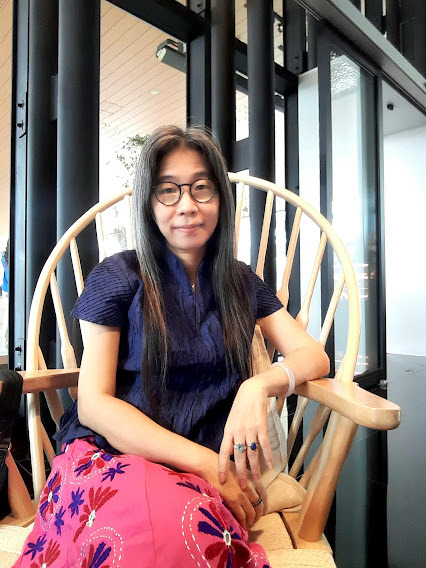

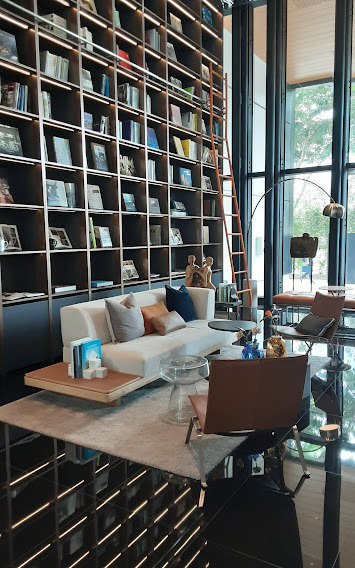
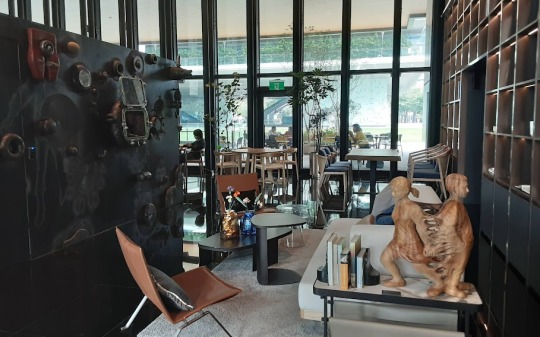
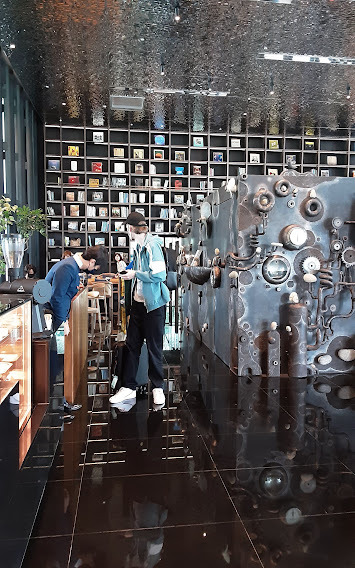
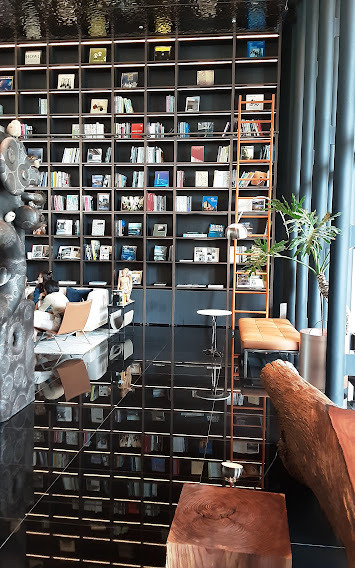



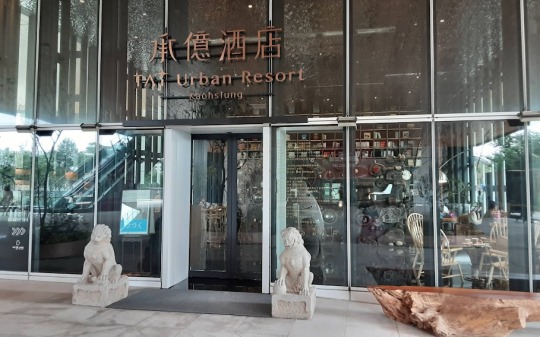
【Part I】城市生活一隅 City Live A Corner ~ Take a breath from studio leather jobs & family and do listen to woman's another twittered 🐦 does it make a difference? lol and enjoying that each moment. 😏
❖ ❖ ❖
I read one new book for me a few pages at there and the quote is brighter point on the cover almost made my heart beating stopped mins. here we see :
『直到失去了全世界之後,我們才開始找到自己。』
"Not till we are lost, in other words not till we have lost the world, do we begin to find ourselves, and realize where we are and the infinite extent of our relations."
─ Henry David Thoreau 梭羅
❖ ❖ ❖
Yesterday I had a nice tea time with good friend at a new opening hotel and there's the lobby coffee shop and a book shop(7F) between the main library of my city connects by a sky bridge. where the new place in the next to my studio take a walking over two street to the hotel, anyway I found one more big bookshop, beside the library to feed my soul in sometime while I need out of my studio it's a way city live do. ☕ Lan~*
● The Hotel 高雄亞灣區承億酒店Lobby咖啡休憩廳 & 7F承風青鳥書店天橋連接市立圖書總館
#chu lan#fine craft artist#leather art artist#taiwan artist life#朱蘭皮藝#高雄亞灣區承億酒店#7F承風青鳥書店#TAI Urban Resort Lobby coffee bar#Henry David Thoreau 梭羅#not till we have lost the world do we begin to find ourselves#eat live love#live love laugh#tea time#I love reading in a corner of bookshop
29 notes
·
View notes